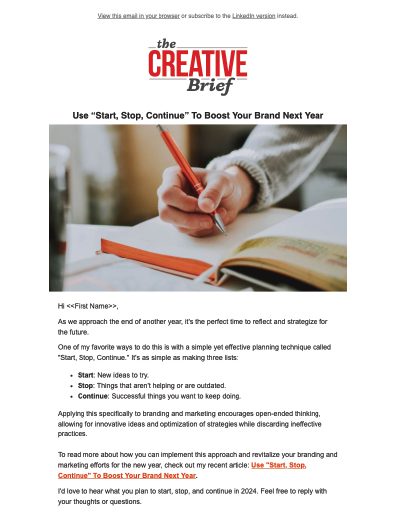Getting Ready for a New Year
As the year draws to a close, it’s an ideal time for small businesses to reflect on their branding and marketing efforts. The “Start, Stop, Continue” method offers a structured yet flexible framework to evaluate the past year’s activities and plan for a more strategic and impactful future. This method encourages critical assessment and fosters growth and innovation in your branding and marketing strategies.
As a small business, taking the necessary steps to ensure long-term success is essential. This includes taking the time to review current strategies and make necessary adjustments. Taking the time to assess and plan for the year ahead can help your small business stay ahead of the competition.
What is “Start, Stop, Continue”?
The “Start, Stop, Continue” method helps businesses identify what new tactics should be implemented (Start), which unproductive or outdated practices need to be discarded (Stop), and what successful strategies should be maintained and possibly expanded (Continue).
It’s as simple as starting with a list divided into these three parts:
- Start: New strategies or ideas to try.
- Stop: Things that aren’t helping or are outdated.
- Continue: The successful actions you want to keep.
Why “Start, Stop, Continue” Works Great for Marketing
This method’s beauty lies in its direct application to a small business’s branding and marketing efforts. It encourages open-ended thinking, allowing you to explore innovative branding ideas, optimize marketing strategies, and discontinue ineffective practices. For marketing and branding, this approach is very effective. It encourages you to think creatively about your brand and how you’re reaching your audience.
For the “start” list, think about things you want to start doing to improve your business or reach your goals. This could include reaching out to past clients, attending trade shows, or writing a monthly blog. The key is to make these things specific and achievable so you can focus on making progress toward them.
For the “stop” list, think about things you want to stop doing that may be holding you back or causing problems for your business. This could include things like procrastinating, overspending, or engaging in unproductive tasks. By identifying these habits and behaviors, you can start working on making positive changes.
For the “continue” list, think about things you are already doing that are working well for your business and that you want to keep doing. This could include things like staying organized, attending strategic networking events, or collecting customer reviews. You can build on your current strengths and successes by continuing to do these things.
How to Use It
Step-by-Step Implementation
1. Start: Finding Fresh Ideas
- Looking at Trends: What’s new in your industry? Are there new ways to connect with your audience, like through different social media?
- Unique Brand Features: Think about what makes your brand special. Maybe there’s a story, feature, or benefit you haven’t highlighted much.
- Questions to Consider: What new technologies or platforms can we use? How can we make our brand more unique?
2. Stop: Dropping What Doesn’t Work
- Evaluating Results: Identify strategies that haven’t been effective. Perhaps some marketing campaigns fell flat, or certain messages didn’t resonate.
- Budget Review: Examine if your marketing budget is being used effectively. Are expensive campaigns yielding enough returns?
- Critical Questions: Which marketing efforts have been unsuccessful? Are there aspects of our branding that don’t appeal to our audience?
3. Continue: Building on Success
- Analyzing Successes: Identify what’s working. For instance, which marketing efforts have driven engagement or sales?
- Expanding Successes: Consider how to expand upon these successful strategies. Could successful campaigns be adapted for new markets?
- Positive Questions: Which of our marketing strategies should we keep doing? How can we enhance our current successful branding?
Putting It Into Action: A Practical Approach
- Organize a Team Brainstorm
- Bring your team together to share ideas. Use tools like whiteboards or digital platforms for a dynamic session.
- Encourage everyone to come prepared with data and personal insights.
- Foster Open Communication
- Create a safe space for honest feedback. It’s vital for uncovering real areas for improvement.
- Embrace risk-taking and innovative thoughts, as these are key to growth and improvement.
- Document and Group Ideas
- Have a designated note-taker to capture all suggestions and discussions.
- Group similar ideas to identify patterns and priorities for the next year.
- Create a Detailed Plan
- From the gathered insights, draft a comprehensive plan for your marketing and branding for the upcoming year, with specific goals and timelines.
- Ensure your plan aligns with your overall business objectives and remains adaptable to market changes.
Embrace Change for Growth
As a small business, adapting and evolving your branding and marketing strategies is vital. The “Start, Stop, Continue” method is not just an exercise in reflection; it’s a strategic tool for transformation. By methodically evaluating your past year’s efforts and planning for the future, your business is well-positioned to enter the new year with a revitalized, more effective branding and marketing strategy. Remember, the key to successful branding and marketing is continuous learning, adapting, and innovating.




